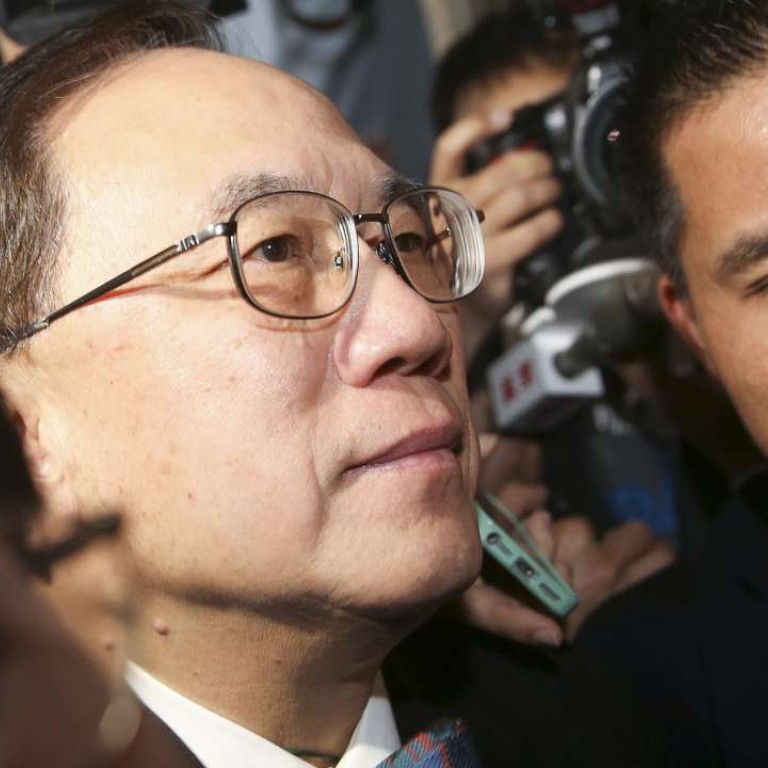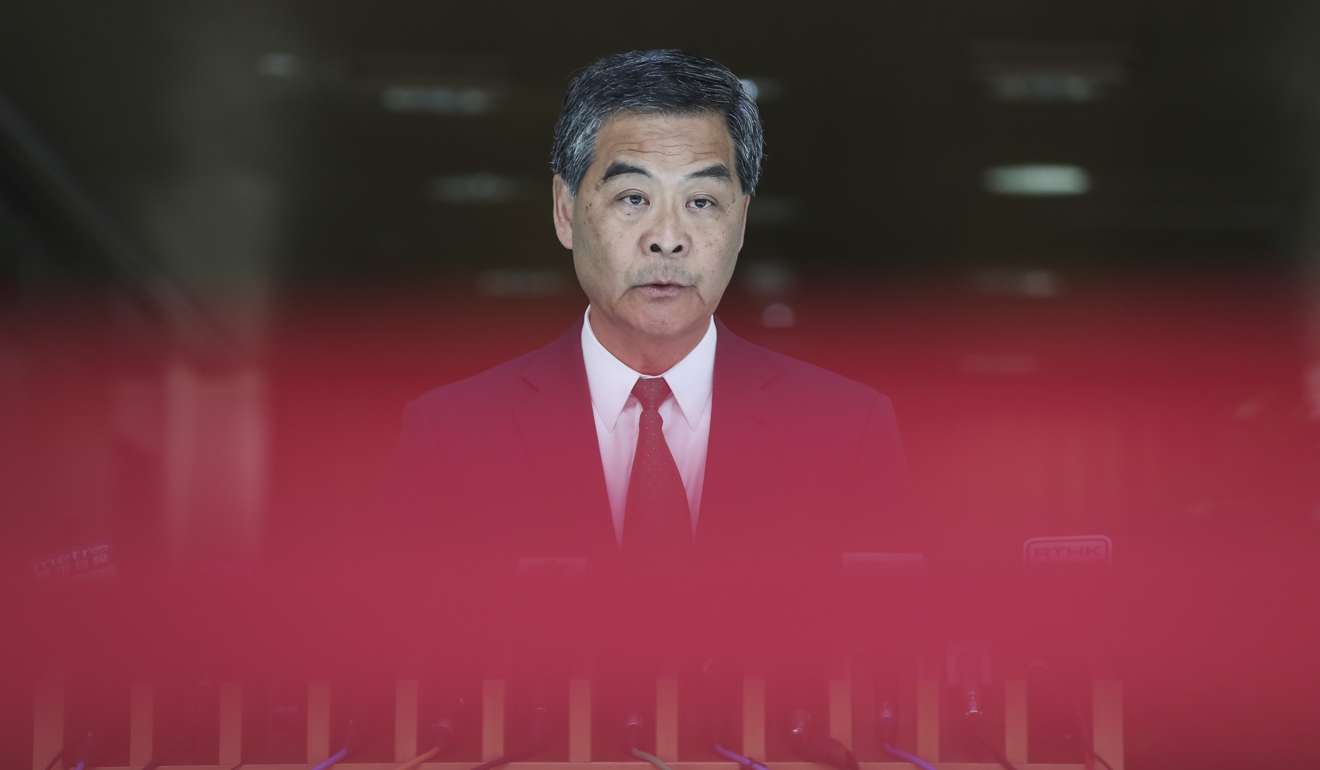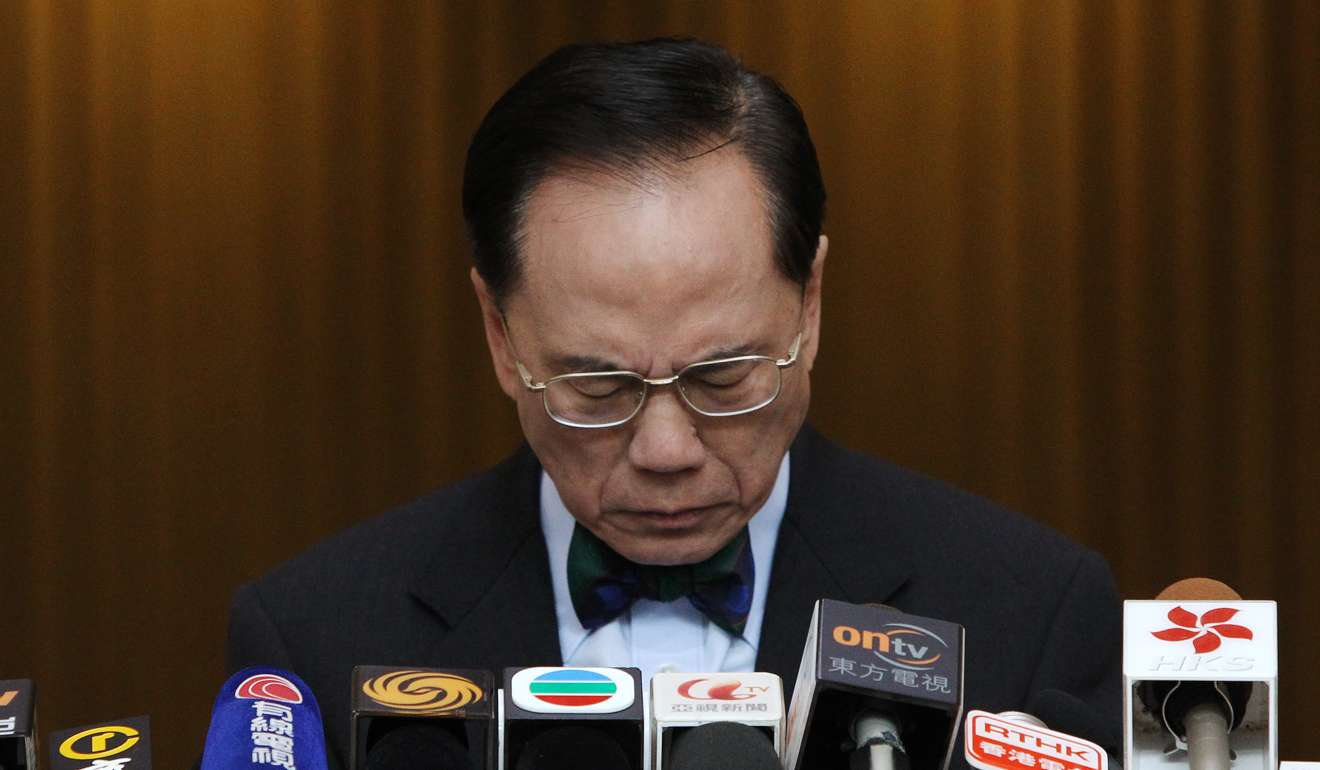
Donald Tsang’s downfall leaves Hong Kong law in the dock
Everyone seems to agree anti-graft legislation needs tightening. With the former chief executive now behind bars, the only question is what’s taking so long?
Five years ago, legal experts recommended Hong Kong tighten the screws on corruption to combat graft involving the chief executive. Despite repeated calls and one chief executive now behind bars, there are still no imminent changes on the horizon.
Following former chief executive Donald Tsang Yam-kuen’s 20-month jail sentence for misconduct this week, legal experts and observers alike renewed calls to make chief executives subject to the same rules as other public officials and clear up some grey areas in the city’s anti-graft laws.
Commentators say the changes are long overdue, and some accuse current Chief Executive Leung Chun-ying of self-interest for the government’s inaction.

Despite years of inaction, the government maintains the same line that it is reviewing the laws.
So why isn’t anything changing?
A law that provokes “bewilderment”
A former British colony, Hong Kong inherited its common law system from the United Kingdom, and with that, the over 300-year-old common law offence of misconduct in public office.
It’s the charge Tsang was convicted of after a jury agreed the former chief executive should have declared he was negotiating with a radio station shareholder over a luxury property at the time he was approving applications from the now-defunct station.
In Hong Kong, the law is not written down in legislation – instead, it has been created through multiple legal cases over time.
Other common law countries including Canada, the Bahamas and most parts of Australia have codified the offence, meaning it is written down in legislation. The UK is currently reviewing its misconduct laws and has indicated the common law misconduct offence is likely to be abolished.
Back in 2000, the former deputy commissioner and head of operations at Hong Kong’s Independent Commission Against Corruption, Tony Kwok Man-wai, said the “vague” and “unfair” law should be codified.
“For the cases we have dealt with, nearly all defendants expressed bewilderment of the existence of such an offence, and to a certain extent this applies to the legal counsel and judicial officers as well,” Kwok said in a speech at the first ICAC symposium in 2000.
This week, Dominic Wai, a partner at ONC Lawyers, who previously worked at the ICAC and advises clients on anti-corruption and white-collar crime, renewed calls for the offence to be codified.
“It’s better to lay it out so that people will know exactly what they can and cannot do,” he told the Post.
“If the law is actually not that clear, it can be manipulated and misused.”
In order to be codified, laws go through a process where revisions are made to make them more comprehensive and clear, he explained.
Changes “long overdue”
Hong Kong’s other main tool in the fight against corruption is the Prevention of Bribery Ordinance (POBO), a piece of legislation introduced in 1971.
Tsang faced a charge of accepting an advantage under the ordinance, but a jury was not able to reach a verdict on the count. He will have to face retrial later in the year on the charge.
Back in 2008, when Tsang was chief executive, he amended the ordinance so some sections would apply to the chief executive – including the section he was ultimately tried for.
But it still contains two sections that do not apply to the top leader, including a section that states officers won’t be guilty of soliciting or accepting an advantage if they have the “general or special permission of the chief executive”.

Following that, he set up an independent review committee to look at the system of conflicts of interest, which recommended both sections of the law should cover the chief executive.
“The present system is totally inappropriate,” the committee, led by former chief justice Andrew Li Kwok-nang, concluded. “The chief executive should not be above the law which applies to publically appointed officials and civil servants.”
At the start of his term in 2012, Leung said he wanted to make the changes swiftly. In 2015 the Democratic Party moved a motion to amend the sections so they covered the chief executive, but the Legislative Council eventually vetoed the motion.
Hong Kong’s former head of prosecutions Grenville Cross SC thinks the reform is “long overdue” and wants to see Leung fulfil his promise.
“It is important for the chief executive not to be above the law which applies to others in government,” he said.
But he pointed out that even if one of the sections was extended to cover the chief executive, the gravity of the offence was “frankly, pretty small beer”, carrying a maximum one-year jail sentence.
Norton Rose Fulbright partner Wilson Ang, who is based in Singapore and specialises in business ethics and anti-corruption law, agreed the law needed to be extended to include everyone – even the chief executive.
The law also does not include entertainment in the definition of an advantage, meaning that while it might be improper for a businessman to give a politician a bottle of wine, for example, it would be fine for the pair to open that bottle and drink it together, he said.
There are also other changes Hong Kong could consider, including putting in place rules like Singapore and Brunei have adopted, where there is a presumption of guilt if an official is caught receiving a gift from someone the government is in a business relationship with, Ang said.
When will things change?
Hong Kong’s government has been saying it is reviewing the POBO since the report in 2012 – but nothing has happened.
Hong Kong’s Administration Wing, which provides support for both the chief secretary and financial secretary and is responsible for looking into possible law changes, said this week that it was reviewing possible amendments to the POBO. But it would not respond to questions on when the review was initiated, when it was due to be completed, or if it was the same review initiated five years ago.
It merely said it was looking “in a holistic manner” what the effects might be on the political structure and the constitutional status of the chief executive.
“The POBO has been serving Hong Kong well in ensuring a corrupt-free environment in both the private and public sectors,” a spokesman for the administration wing said.
“Upon completion of the study, the government will initiate the legislative procedure at the appropriate juncture.”
After Donald Tsang’s conviction ... the pressure on the government is going up
As for the possibility of codifying the misconduct offence, the spokesman said the law had been “spelt out” in previous cases, and the government would consider reform “if necessary”.
James To Kun-sun, a Democratic Party lawmaker, said he felt frustrated after pushing for the POBO law changes for years.
“I can only say I would blame C.Y. Leung,” he said of why the changes had stalled.
He added that Leung could be motivated to keep the status quo for reasons of “self-interest”, namely wanting to avoid being prosecuted under it, despite promising at the start of his term that he would make changes.
Polytechnic University political scientist Dr Chung Kim-wah was more optimistic that change was only a “matter of time”.
The public uproar about Tsang’s conviction was likely to push the next chief executive, who will be elected next month, to make changes, Chung said.
“After Donald Tsang’s conviction, people are becoming aware of this problem again, and the pressure on the government is going up.”
Additional reporting by Chris Lau

